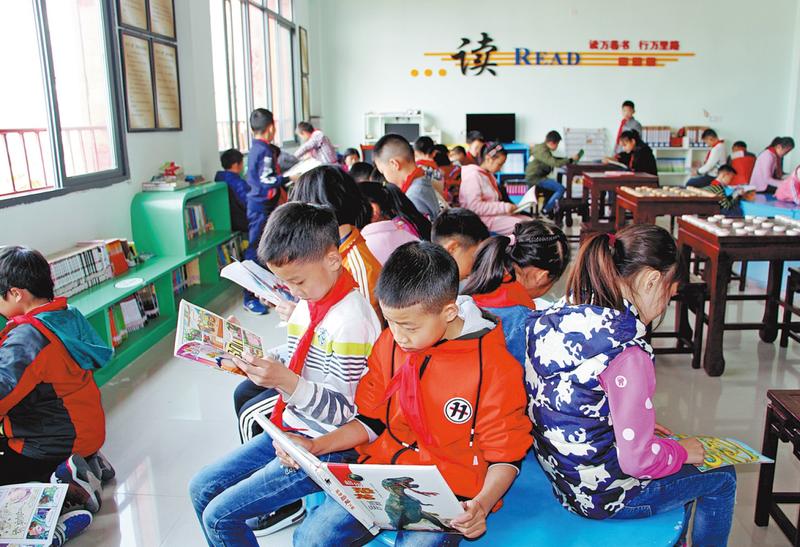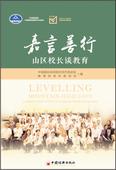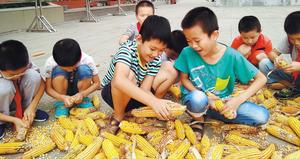A new book compiles essays by headmasters in remote areas about the challenges to, and achievements in, education in China's vast countryside, Erik Nilsson reports.
 Children read in the library of No 7 Primary School in Tongjiang county in Sichuan province's Bazhong city. (PHOTO PROVIDED TO CHINA DAILY)
Children read in the library of No 7 Primary School in Tongjiang county in Sichuan province's Bazhong city. (PHOTO PROVIDED TO CHINA DAILY)
Yang Hui was startled when a silhouette dashed across the primary school's campus in the dark and hid behind a tree.
"Who's there?" the headmaster yelled. "Get out of here! Come out so I can see you!"
Rural schools’ ‘hardware’ is rapidly catching up with urban schools. But they still lag behind in ‘software’, especially teaching resources
Kuang Xiaolan, principal of Shangmo Township Central Primary School in Ji’an city’s Taihe county, Jiangxi province
To her surprise, it wasn't an intruder but rather a student who eventually emerged, recalls the headmaster of Xinjin Central Primary School in Hainan province's Qiongzhong Li and Miao autonomous county.
It was 12-year-old Wang Mingda, a shy boy who excelled at soccer but struggled in class.
"Why haven't you gone home?" Yang asked.
"It's so late."
It was 9:30 pm.
The boy explained that his aunt-who, along with his grandfather, tried to take care of him since his parents couldn't-had told him she couldn't send him to the soccer match the next morning.
So, he planned to hide on campus overnight so he could make the game.
Yang learned that the boy's mother had abandoned him to remarry. His father, who was disabled by a fall, tried to work as a migrant in cities.
"Mingda was lonely and dejected without parental supervision. He gradually lost interest in learning and communicating with others," Yang explains.
"Soccer was his only joy. So, he didn't want to miss the game, even if that meant he couldn't go home and had to sleep outside on a stone bench for the night. I told him students and teachers want to make friends with people like him, who have dreams."
Yang prepared and shared an early breakfast with the boy before the game.
"He was the biggest star on the field that day," the headmaster recalls.
"He has changed since then. He likes to laugh and play with his classmates. And his studies have steadily improved."
Yang wrote about this story in a chapter in Levelling Mountain-high Gaps: Lessons from China's Leading Rural Educators, recently published by China Economic Publishing House. The book compiled by the NGO Visionary Education features essays by over 50 principals from schools in remote and underdeveloped areas throughout the country.
"We hope this book will bring educational experiences and reflections to more principals and encourage more principals to share their own wisdom in the field of education," says Li Huiwu, deputy managing editor of China Economic Publishing House.
"Good principals lead to good schools. And good schools nurture good talent."
 The cover of the book, Levelling Mountain-high Gaps: Lessons from China's Leading Rural Educators. (PHOTO PROVIDED TO CHINA DAILY)
The cover of the book, Levelling Mountain-high Gaps: Lessons from China's Leading Rural Educators. (PHOTO PROVIDED TO CHINA DAILY)
Trials and triumphs
The essays discuss such challenges as academically and psychologically helping "left-behind" children of migrants, recruiting and retaining qualified staff, and updating outdated pedagogy. And they examine such solutions as engaging migrant parents and caretaking relatives remotely, offering emotional and material incentives for instructors, and innovation.
"Each story reflects rural principals' dedication, exploration, innovation and hard work," says Feng Haiyan, headmaster of Randeng Temple Primary School in Baoji city's Maying town in Shaanxi province.
"We are a group of ordinary people with grand dreams. And we work hard to achieve these goals step by step. Our stories are worth hearing."
Her chapter examines ways to not only overcome the disadvantages, but also capitalize on the overlooked advantages, of schools in the countryside.
"Although rural schools have less access to resources compared to urban schools, and especially quality teachers, they do have unique advantages, such as natural environments," she explains.
"So, teaching children to be curious about nature is our innovation. In rural areas, we have unique access to such resources as flowers, plants, mountains, water, local food and customs.
"Ultimately, the processes of living and learning are interlinked. Our 'rural-experience centric' courses are also a unique way for teachers to feel their work is valuable, innovative and meaningful."
Emotional and material incentives for educators are a theme that many of the headmasters address, since qualified candidates may prefer to take cushier jobs in more comfortable locations.
"Rural schools' 'hardware' is rapidly catching up with urban schools. But they still lag behind in 'software', especially teaching resources," says Kuang Xiaolan, principal of Shangmo Township Central Primary School in Ji'an city's Taihe county in Jiangxi province.
"Because rural schools are remote, the lifestyle in these areas is less exciting. So, it's hard to persuade excellent young teachers to stay. The only way is to provide continuous training and a sense of fulfillment."
Li Guangjie's first major action when he took over as principal of the Central School in Fusong county's Xianrenqiao town in Jilin province's Baishan city in 2017 was to introduce new rewards and training for teachers.
Subsequently, 18 of the school's instructors won special recognition from the county, including two who were named "leading county-level teachers".
 Fifth-and sixth-grade students at No 7 Primary School in Bazhong, Sichuan province, harvest corn that they'd planted. (PHOTO PROVIDED TO CHINA DAILY)
Fifth-and sixth-grade students at No 7 Primary School in Bazhong, Sichuan province, harvest corn that they'd planted. (PHOTO PROVIDED TO CHINA DAILY)
Moving forward
Another common theme is the difficulty of helping left-behind children like Mingda.
Many are socially withdrawn, ambivalent about schoolwork and lack confidence.
Nearly half-1,219, to be precise-of the students at Tongjiang No 6 Primary School in Bazhong city, Sichuan province, are left behind.
Principal Gao Huaiyang recalls feeling concerned about how "timid "first grader Luo Haoxuan was when he met the 7-year-old last year.
Gao talked with Haoxuan, and his parents and grandparents, and encouraged the boy. He also arranged for one-on-one tutoring with Haoxuan's Chinese-language teacher, leading to huge improvements in his reading and writing.
"Now, in the second grade, Haoxuan speaks boldly. He tells stories in class. He's more confident," Gao says.
Ten-year-old Liu Junliang grew up "in silence" since his parents weren't involved in his upbringing, Gao says.
His grandfather, who raised him, could only provide meals and wash his clothes. His parents had divorced. And while his mother had custody, she cared for other relatives, as did his grandpa.
"Grandpa accompanied Junliang to sign up for the first grade," Gao recalls.
"I asked, Child, where are your parents? He hung his head and didn't speak. He hid behind his grandfather."
When the grandfather explained the situation, Gao contacted the boy's parents and asked them to send their son videos every night. He encouraged Junliang in class and asked him to help with tasks he knew the boy could achieve.
And he bought the boy a book that addresses a lot of "why" questions about the world.
"After a month, Junliang's personality gradually became brighter," Gao recalls.
"Now, he asks me questions when he sees me: 'Teacher Gao, why are plum blossoms not afraid of the cold?' 'Mr Gao, do you know where I hid my lost baby tooth? "Mr Gao, why is the center of bamboo empty?'"
Ultimately, the stories in Levelling Mountain-high Gaps aren't just lessons for students and rural educators but for the world to understand the trials and triumphs of education throughout China's vast countryside.
Contact the writer at erik_nilsson@chinadaily.com.cn


